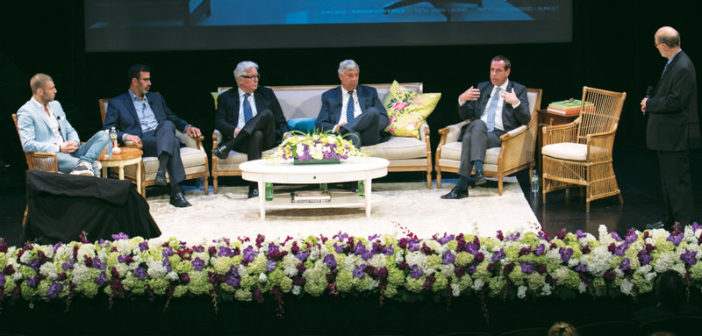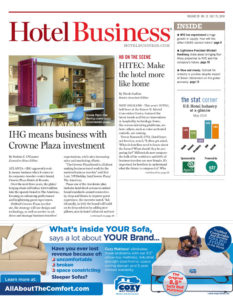NEW YORK—At this year’s Boutique & Lifestyle Lodging Association (BLLA) Boutique Hotel Investment Conference, held here, much was discussed, including design, F&B, investment, equity, leadership, Airbnb—and even Donald Trump. The event brought out speakers for more than 10 panels, and featured an opening address by Frances Kiradjian, founder and CEO of BLLA and a keynote speech by Pilar Guzmán, editor-in-chief of Condé Nast Traveler. Ian Schrager, CEO of Ian Schrager Company, was interviewed in a solo panel moderated by Vanessa Yurkevich, Digital Correspondent at CNN Money.
This was a successful year for the boutique and lifestyle segments, and a milestone year for the annual investment conference. “We were up approximately 30% this year. We believe this is because the word is spreading about this conference among independent hoteliers, as well as those vendors involved in consultancy, banking and other hotel supplies and services,” explained Kiradjian. Last year, there were 275 attendees while this year, there were 350.
Asked if she thinks boutique and lifestyle hotels are growing in popularity, Kiradjian said, “Yes, definitely. As Airbnb and similar OTAs grow their market share, so do the world’s boutique and lifestyle properties. As evidenced by the occupancy and revenue numbers reported at the conference, the ‘like’ needle keeps rising for these hotels.” For this, Kiradjian referred to a BLLA study delivered by Mark VanStekelenburg of PKF Consulting who reported that supply growth has been reduced when it comes to the boutique forecast while demand growth is outpacing the industry.
As Kiradjian referenced, Airbnb was a topic of interest throughout the panel. At the end of the conference, Schrager made the bold statement that “Airbnb is coming for your kids.” He called room-sharing platforms a threat to the hotel industry.
Some speakers at the conference, though, said lifestyle brands must remember they were once a disrupter to the hospitality sector. “Ironically, we are talking about Airbnb as the disrupter but we were once the disrupter,” said Bill Walshe of Viceroy Hotels. “Ian Schrager was the ultimate disrupter. But then we grew up, and we put parameters around ourselves. We must disrupt ourselves again and remember how fun it was back then.”
According to Walshe and others at the conference, Airbnb is serving a particular customer’s need that boutiques can tap into. To attract Airbnb’s customers, hoteliers could bring a home-like feel to their accommodations and amenities. Furthermore, research performed by Gerald Barad of Triumph Hotels proved that Airbnb customers prefer the platform because they want to plan vacations with multiple families and friends and it’s easier to get a house than book a number of separate rooms. In fact, Barad said, there is a push to make hotel rooms smaller, but that may not make sense. “Demand for family rooms exceeds the demand for suites. We have made changes to our suites to accommodate this need,” said Barad.
In regard to boutique design, Schrager commented, “The successful boutique and lifestyle hotel is about attitude and approach, manifesting something about popular culture. Design is just one of the elements,” he said.
Schrager also expressed the importance of design when it comes to a hotel’s lobby, calling it “critical.” Condé Nast Traveler’s Guzmán agreed with the importance of lobby design and said, “You want to create a hotel lobby that will go from coffee to cocktails.” Guzmán compared hotel lobbies to a modern day piazza because the lobby, by definition, should be like a meeting place that connects locals and travelers.
The hotel’s F&B operation is as important as its lobby when it comes to appealing to today’s traveler. “We never wanted to be trendy, we always wanted to be aware of the trends,” said Scott Gerber, CEO of the Gerber Group. He also spoke about the grab-and-go element seen in many hotels today and said it is an easier concept for guests than waiting for room service.
“The whole idea of restaurants and bars is to drive occupancy and rate. If they didn’t, I wouldn’t do them. They are a pain in the neck,” Schrager said. He also commented that he prefers outside operators over hiring managers to do the F&B because an operator is “motivated by the profit margin.”
Also agreeing with the idea is Jody Pennette of Cb5, who moderated the talk on F&B. She said, “If someone has a bad experience in a hotel restaurant, the hotel will get the black eye.” HB


